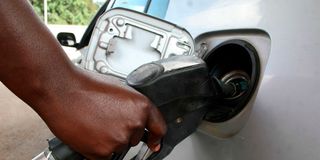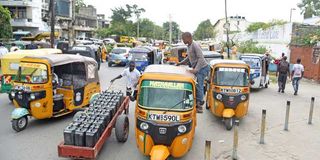Premium
Selling your car? Here’s how to attract a buyer and make a quick sale

Buyers will base their own valuation on first overall impressions and on closer inspection of details. On both of those counts, the car should first and above all be spotlessly clean, not just a wash and polish of the primary surfaces, but a meticulous valet job on every detail.
Gavin,
When selling a car, what are the most important and inexpensive things that can improve its value?
Geoffrey
Short answer: Think about the wrongs that could reduce the value, and put them right.
Longer answer: Buyers will base their own valuation on first overall impressions and on closer inspection of details. On both of those counts, the car should first and above all be spotlessly clean, not just a wash and polish of the primary surfaces, but a meticulous valet job on every detail, inside and out, under the bonnet, in the boot, in the engine compartment and on the floor and under it.
In every nook and cranny, and along and between creases, around every knob and dial on the dashboard, even the reflectors inside the lights. Not everything can or needs to look brand new, but it should look clean, clean, clean. The sales message: this car has been well looked after.
The cleaning process will reveal any unsightly damage; rust, dents, cracks, oil leaks, tears, scratches and scrapes, missing screws, crooked rubber seals, perished wiper blades, torn floor mats or seat fabric etc. Fix them. Track down any rattles or squeaks (which you might have got used to) and fix those, too. “Well-repaired” is as positive an indicator as “replaced”.
Anything the buyer might look at or test should be correct. Next, make sure all the driver controls work as they should. The headlights, the indicators, the wipers, the horn, every bulb inside and out, the glovebox clip, the door latches and locks, the rearview mirror adjustment, the seat slides and adjusters, the handbrake ratchet, the levers and knobs, and even the jack and wheel brace.
On that note, consider the tyres. They have a major impact on what the car looks like. They don’t need to be new (that could be cause for suspicion) and they should not be overtly polished. Just clean, black, and with plenty of even tread (including the spare) is both visually appealing and technically reassuring.
If your car has elegant or desirable accessories, do not remove them. Even if you want to charge separately for them, leave them on when showing the car: accessories are attractive.
In deciding whether to buy and how much to pay, the buyer will be reassured that the vehicle has been carefully used, well maintained and has no disqualifying fault. A comprehensive service record or a recent inspection report also does no harm. Getting even quite an old car into tidy condition need not be expensive. Pre-sale preparation is as much about care as it is about cash.
The surest ‘additive’ in super fuels is marketing…
Gavin,
Thank you for your informative column. Does V-Power give better fuel economy than normal petrol? Does it have other advantages in the life and condition of my vehicle?
Nicholas
The answer is “maybe”, which has exactly the same meaning as “maybe not”. If there were scientifically certain, significant and universal benefits for all petrol-engined vehicles and all their various users and applications, Shell would tell you what they are and offer independent, authoritative and verifiable test results. They do not.

V-Power is a very good fuel for almost all petrol engines. So are many other fuels also made by Shell and most other leading brands
V-Power is a very good fuel for almost all petrol engines. So are many other fuels also made by Shell and most other leading brands. Amid all the marketing guff (which is almost entirely without meaningful information), what we can be reasonably certain of is that Shell V-Power has a higher octane rating (and a higher price) than Shell Fuel-Save. That could be a benefit to cars with especially high-compression engines; above 9.0:1 and progressively more significant for compression ratios upwards from there.
In the old days when petrol was either “Regular” or “Super”, octane ratings ranged between 87 and 95. Then came a general increase in compression ratios in engine design and the introduction of a widespread system of “star” ratings for fuel. Stars 1-3 covered the existing spread, and stars 4 and 5 took the options a bit higher.
The combination of high compression and higher octane does, with some scientific certainty, release more “energy” from the combustion of a litre of fuel, which can be converted into either more power or less consumption. Not both simultaneously. And either benefit also relies on all manner of other factors of design and use.
In parallel, car makers specify a recommended octane rating (fuel grade) for each of their engines. What they are saying is that at a lower grade than that, the engine will not perform optimally in all respects of economy, performance and durability. A higher grade will work just as well, but not significantly better.
The manufacturer’s recommendation should be your principal guide. Go higher if you wish (and assess any difference for your particular car and personal driving patterns), but not lower.
All petrols start as an almost identical fuel. All have several additives that serve different purposes and provide improvements and raise the octane rating. Neither you nor I know exactly what they are or what tiny proportions they come in or who adds more or less of what. One thing we can be certain of is that within the oil industry itself, there are no secrets.
Every brand has the technical know-how and the equipment to know exactly and completely what is in every other brand. If one discovered a unique recipe of additives that was unequivocally superior to all the others, at a cost that increased sales profitably, it would not stay unique for long.
None of our petrol stations declare octane ratings on their pumps. A likely reason is that they frequently vary. Efforts at global standardisation have achieved a base rating of 91 almost everywhere, and 93 is the norm.
First boda bodas, now tuk-tuks, all this noise can’t be good…
Dear Gavin Bennett,
There are now three-wheeler tuk-tuks everywhere, which are an obstacle to traffic and represent an enormous noise nuisance with their out-dated and unmuffled diesel engines. There are more and more motorcycles with manipulated exhaust systems also making a lot of noise. Is law enforcement unable to remedy this? Everybody I meet suffers from noise pollution; something has to be done, otherwise people will get sick.
Klaus E
So say all of us! And the problem is not just tuk-tuks and boda bodas, which at least have the merit of ‘moving on’ after shattering the peace (though only to be replaced by dozens more ‘moving in’). The problem is worst in cities and big towns, but smaller villages and even remote rural areas are not spared from these head-banging sounds nor mobile advertising vans, buskers and election campaigners who do ‘move on’ but sometimes only after several hours.

Tuk-tuks and boda bodas bestow a great amount of good for both their operators and their customers, who can be counted in millions.
Equal or even greater culprits that make a massive amount of noise don’t move at all - churches, bars, nyama choma joints, and many shops whose loud speakers blast a cacophony of amplified sound hour after hour, day after day, and even at night. Their impact is worst in rural areas, where there are fewer big buildings acting as sound barriers, so the caterwauling can be heard for many kilometres in every direction, with a kind of noise akin to a herd of buffalo charging through a cattery.
All of these practices constitute severe “breaches of the peace” – an indictable offence. There are also some more specific NEMA laws which either forbid or strictly curtail any amplified sound outside a building, especially in residential areas, without a case-by-case (specific single event) license which has time, duration, frequency and volume conditions.
There’s even a time limit (six minutes) on prolonged dog-barking, with a fine of Sh5, 000 per offence. In all these respects, policing is behind the curve of legislation. I have spoken to a number of evangelical pastors, and all agree that God is all-seeing and all-knowing, even in complete silence, but when asked to bear that in mind with their loudspeakers, they claim ‘freedom of worship’ rights, apparently blind (and deaf) to the fact that the same law axiomatically confers an equal right not to worship.
I can walk away from a church if I don’t want to hear a sermon, but I should not be expected to walk away from my own home! They counter that with the reported invocation to “spread the word”. I think I am right in saying that phrase was coined sometime before National Panasonic invented 3-gigawatt megaphones for pop festivals. No deity is making this noise. Mortals and man-made gadgets are.
Meanwhile, tuk-tuks and boda bodas bestow a great amount of good for both their operators and their customers, who can be counted in millions. But they, too, are supposed to be regulated by rules, including a maximum permitted level of decibels.
Noise is a complex thing to measure because it is “logarithmic” – the difference between 40dB and 20dB is not twice as loud – it is many hundreds of times louder. The noise of a jumbo jet engine is one thousand trillion (1,000,000,000,000) times louder than a whisper.
Normal conversation registers about 50dB. Revved car engines about 75dB. Sustained exposure to noise levels above 100dB are emphatically damaging to human health (and even more serious for animals whose hearing is far superior to ours). In humans, the effects range from heart disease to hyper-anxiety, reproductive malfunction, premature hearing loss, and in children, to brain damage and personality disorders. Tuk-tuks that sound like a cross between a jack-hammer and a machine gun are in that ‘damage’ category. And they are, of course, a diabolical anomaly on highway traffic flows.
We do not lack the knowledge nor the legal authority nor the laws to control that, and we have the technology to considerably reduce the noise they make in the first place. It is quite possible to quadruple the length of their exhaust pipes, double the number of expansion boxes (silencers) and end the tailpipe above their roofs so the remaining sound dissipates instead of echoing inside their tin-drum bodies.
What we lack, in this and more than a few other spheres, is clear and fair enforcement, with courtesy, competence and diligence. Corruption and policies pursued as a revenue-generating contrivance are the death of efficiency, merit and good order. And those thoughts are shared without making any noise.
***
Do you have a motoring question? Email [email protected]





